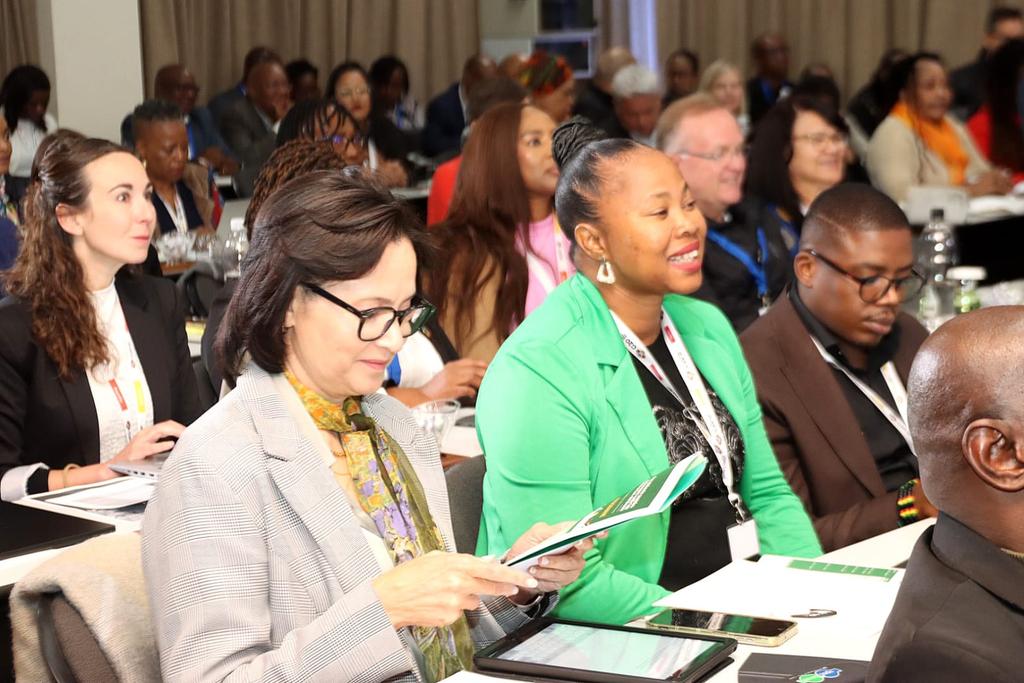At G20 gathering, South Africa elevates early childhood as a global priority

South Africa’s Minister of Basic Education, Siviwe Gwarube
In a rare move for a global economic forum, the G20 summit in South Africa last week devoted an entire day to early childhood, signalling growing recognition that investing in the earliest years of life is critical to achieving long-term goals around equity, sustainability, and shared prosperity.
More than 160 delegates attended with representatives from across the G20 nations, including Brazil, Indonesia, UAE, Canada, France and Saudi Arabia and many more.

The host country’s leadership was on full display. President Cyril Ramaphosa has already placed early childhood care and education at the heart of South Africa’s national development agenda. Last week’s convening marked a concerted effort to move the issue up the international priority list.
“South Africa has identified early childhood as a top priority for the G20,” said Minister of Basic Education Siviwe Gwarube, who opened the day’s discussions. She called the sector “the most strategic cost-effective investment a society can make.”
Evidence presented at the summit backed her statement. Ben Hewitt, from Theirworld, shared analysis suggesting that if G20 countries increased spending on universal support for families by just 0.6% of GDP, 16.7 million children could be lifted out of poverty within two years. An additional 0.4% GDP investment in universal preschool and childcare, he said, could bring primary school enrollment rates to nearly 100% across G20 nations.
Beyond immediate impact, the economic rationale is striking: investments in high-quality early childhood care and education between the ages of 2 and 5 can yield long-term benefits estimated at 8 to 23 times the initial cost.
Theirworld collaborated with South African organisations Smart Start and Ilifa Labantwana to produce a policy briefing shared with G20 leaders. The briefing underscores how targeted, scalable programs in South Africa are achieving measurable outcomes—examples that other G20 countries could adapt in their own contexts. (Download the briefing below.)
International contributions came from Canada, France, and Saudi Arabia, who shared their national approaches to early years development. Elizabeth Lule of the Early Childhood Development Action Network (ECDAN) and Rebecca Hickman of Smart Start spoke about the importance of systems-level thinking to ensure sustained, equitable progress.
The event also served as a platform for civil society engagement. Delegates from around the world endorsed the Act For Early Years campaign, signing the “Minifesto” calling for greater political and financial commitment to the early years. The campaign has already garnered support from more than 150 organizations, which have collectively signed an open letter urging President Ramaphosa to place early childhood at the center of the G20’s legacy.
Minister Gwarube reinforced the national stakes. “If we are to re-imagine education in South Africa, then we need to improve the outcomes across the board, and we need to start at the beginning,” she said. “Investing in the early years of a child’s life is not just an optional extra—it is the most strategic and cost-effective investment a society can make.”
Data presented by Sibongile Khumalo of DataDrive2030 revealed that only 46% of South African children enrolled in early learning programs were deemed school-ready, with clear disparities along socio-economic lines. The findings underscored the urgency of closing developmental gaps before they widen—particularly in contexts marked by deep inequality.
Mathanzima Mweli, Director-General of the Department of Basic Education, offered a final reminder of what’s at stake. “Early childhood is not a soft issue—it is a hard prerequisite for equity, productivity and national development,” he said.
As G20 leaders consider how to deliver on their vision of solidarity, equity and sustainable development, South Africa’s push for early childhood investment may well shape the path forward.
